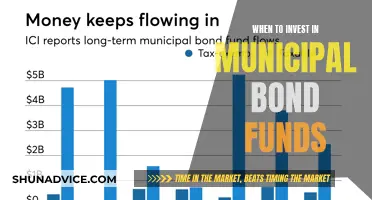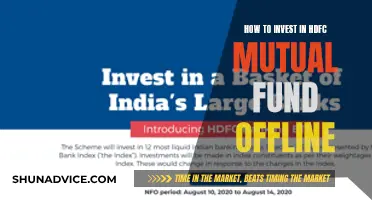
Investing in mutual funds on Vanguard's website is a straightforward process that can help you achieve your financial goals. Vanguard is a well-respected investment firm that offers a diverse range of low-cost mutual funds, providing investors with strong performance and market diversification. By investing in a mutual fund, you can buy shares in hundreds or even thousands of securities at once, reducing risk and providing instant diversification. Vanguard's website offers a user-friendly platform where you can explore different types of mutual funds, such as money market funds, bond funds, stock funds, and target date funds. You can also choose from both index funds and actively-managed funds. The process of opening an account and buying mutual fund shares is simple and can be completed in just a few minutes. With Vanguard, you can be confident that you're investing with a trusted firm that has a strong track record of performance.
| Characteristics | Values |
|---|---|
| Investment options | Mutual funds, ETFs, stocks, bonds, options, CDs, money market funds |
| Investment accounts | Taxable investment account, individual retirement account (IRA), solo 401(k), SEP IRA, SIMPLE IRA, UGMA/UTMA, 529 college savings account |
| Minimum investment | $1,000 for Vanguard Target Retirement Funds and Vanguard STAR Fund; $3,000 for most other funds; $50,000 for most actively managed funds; $1 for Vanguard ETFs |
| Fees | $25 annual account service fee for brokerage and mutual fund-only accounts; no fee to open an account or buy/sell Vanguard mutual funds or ETFs online |
| Diversification | Mutual funds invest in hundreds or thousands of securities, providing diversification; ETFs also provide diversification |
| Management | Actively managed funds are selected by professional fund managers; Index funds are passively managed to match the performance of a market index |
| Risk | Mutual funds and ETFs are less risky than individual stocks as they invest in a range of companies and industries |
What You'll Learn

Choose an account type based on your savings goal
When choosing an account type based on your savings goal, it's important to consider your risk tolerance and financial objectives. Vanguard offers a range of account types to suit different investment goals, and understanding your goals is crucial as certain accounts are tailored towards specific objectives and may have different tax implications or penalties.
If you're saving for retirement, a retirement account such as an individual retirement account (IRA), 401(k), or SEP IRA could be suitable. These accounts offer tax advantages and help you build a nest egg for your golden years.
For higher education savings, a 529 plan is a tax-advantaged option to consider. This type of account enables you to save for your child's, another family member's, or even your own education expenses.
If you have more general investing goals, such as saving for a home, a car, or other milestones, a taxable investment account might be the right choice. This type of account provides flexibility and allows you to invest in a variety of investment options.
Additionally, you may want to evaluate the different investment products available within each account type. Vanguard offers a wide range of investment options, including mutual funds, exchange-traded funds (ETFs), stocks, bonds, certificates of deposit (CDs), and money market funds. Each investment product has its own risk profile and potential returns, so choosing the right mix of investments within your account will depend on your risk tolerance and financial goals.
Remember, investing involves risks, and it's essential to carefully consider your options before making any decisions.
Upstox Mutual Funds: A Step-by-Step Guide to Investing
You may want to see also

Explore different types of mutual funds
When exploring different types of mutual funds on Vanguard's website, it is important to understand the various investment types and how they can help you meet your goals.
Vanguard offers a range of mutual funds, including money market, bond, balanced, stock, international, and sector funds. These funds can be combined to create a well-balanced portfolio. For example, money market funds are relatively low-risk investments that focus on short-term securities, while stock funds allow you to invest in domestic or international companies of all sizes and industries.
Additionally, Vanguard has introduced index funds for individual investors and continues to be a leader in this space. Index funds aim to match the performance of market indexes, such as the S&P 500 or the Dow Jones Industrial Average. Vanguard also offers actively managed funds, where fund managers handpick investments to try to beat the market.
Vanguard's mutual funds provide instant diversification, as they invest in a wide range of companies and industries. This lowers your risk because if one security performs poorly, the others can offset the losses.
When deciding which mutual fund is right for you, consider your savings goals, risk tolerance, and time horizon. For instance, if you are a recent college graduate, you may prefer a target-date fund that is more heavily invested in stocks, as you have a longer investment horizon. On the other hand, if you are approaching retirement, you might opt for a more conservative money market or bond fund.
Vanguard also offers environmental, social, and governance (ESG) funds, allowing you to invest in alignment with your personal values.
With Vanguard's tools and resources, you can explore and compare different types of mutual funds to make confident investment decisions that fit your needs.
Mutual Fund Profits: Where to Invest and Why
You may want to see also

Understand the basics of risk and return
Risk and return are two fundamental concepts in investing, and understanding them is crucial when investing in mutual funds on the Vanguard website or elsewhere. Here's a detailed guide to help you understand the basics of risk and return in the context of mutual funds:
Understanding Risk
Risk refers to the potential for loss or the variability of returns associated with an investment. In the context of mutual funds, it's important to recognise that all mutual funds carry some level of risk. The risk of investing in a mutual fund is influenced by the underlying risks of the stocks, bonds, and other assets held within the fund. Here are some key points about risk:
- Diversification and Risk Mitigation: Mutual funds offer a level of diversification, which helps to spread risk across multiple investments. By investing in a range of companies and industries, the failure or poor performance of one company is less likely to significantly impact the overall fund. This is often described as "not putting all your eggs in one basket."
- Risk and Volatility: The more volatile a fund is, the higher the investment risk. Volatility refers to the degree of fluctuation in the price of a fund's shares over time. A fund with highly variable returns is considered more volatile and riskier than a fund with more stable and predictable returns.
- Risk and Time Horizon: Time is a factor in managing risk. Generally, those with a longer time horizon, such as young investors, can take on more risk. The stock market may experience ups and downs in the short term, but historically, it has tended to increase in value over the long term.
- Risk and Fees: Fees and expenses associated with mutual funds can impact your overall returns. Higher fees can eat into your returns over time, increasing the risk of underperformance relative to lower-fee funds.
- Risk and Investment Type: Different types of mutual funds carry varying levels of risk. Money market funds, for example, are considered relatively low-risk, while stock funds and bond funds can have higher risk profiles.
Understanding Return
Return refers to the profit or gain generated by an investment. In the context of mutual funds, returns can come from different sources, and it's important to understand how these returns are generated:
- Dividend Payments: Mutual funds can earn income from dividends on stocks or interest on bonds held within the fund. These earnings are then distributed to shareholders, providing a return on their investment.
- Capital Gains Distributions: When the price of the securities within a mutual fund increases, and the fund sells those securities, it realises a capital gain. At the end of the year, these capital gains are typically distributed to investors, providing them with a return.
- Increased Net Asset Value (NAV): If the market value of a fund's portfolio increases after deducting expenses, the value of the fund and its shares also increases. This increase in NAV reflects a higher value for your investment and, consequently, a return.
- Total Return: When evaluating mutual funds, you may come across the term "total return." This refers to the net change in value of the fund over a specific period, including any interest, dividends, or capital gains generated, as well as the change in market value.
Risk-Return Trade-off
It's important to understand the relationship between risk and return. Generally, the greater the potential return, the greater the risk. Mutual funds with higher potential returns often carry a higher level of risk. Conversely, investments with lower risk tend to offer lower returns. This relationship is known as the risk-return trade-off.
Vanguard's Approach to Risk and Return
Vanguard mutual funds aim to balance risk and return by offering diversified, low-cost investment options. Here are some key considerations about Vanguard's approach:
- Diversification: Vanguard emphasises diversification across multiple securities to help offset the risk of any single investment performing poorly.
- Professional Management: Vanguard's funds are managed by experts who carefully select and monitor investments, helping to mitigate risk and optimise returns.
- Low Costs: Vanguard is known for its relatively low expense ratios, which can enhance returns by minimising the fees deducted from fund returns.
- Index Funds: Vanguard offers index funds that aim to match the performance of market indexes. These funds are passively managed, resulting in lower fees and potentially better returns compared to actively managed funds.
In summary, understanding the basics of risk and return is essential when investing in mutual funds on the Vanguard website or elsewhere. By considering the underlying risks, return sources, and Vanguard's approach to risk management and return generation, you can make more informed investment decisions.
Baillie Gifford Fund: Where Should Your Money Go?
You may want to see also

Learn how to open an account online
Opening an account with Vanguard is free, easy, and fast. The process should take around 5-10 minutes. To get started, select "Open an account" from the menu, then choose "Start your new account". You will then need to decide on an account type based on your savings goal. Vanguard offers a range of account types, including taxable investment accounts, individual retirement accounts (IRAs), solo 401(k)s, SEP IRAs, SIMPLE IRAs, UGMA/UTMAs, and 529 college savings accounts.
When opening an account, most investors fund their new accounts with an electronic bank transfer. If you choose this option, make sure you have your bank account and routing numbers readily available. You can also choose to roll over funds from another investment account.
Once your account is open, you can connect your bank to your Vanguard account and move other money into your new Vanguard account. You can then start buying and selling mutual fund shares through your Vanguard account dashboard.
To avoid account service fees, register for secure access to the Vanguard website and opt to receive account documents electronically.
RIA Mutual Fund Investment: What's the Catch?
You may want to see also

Compare Vanguard's fees to industry averages
Vanguard is a leading global investment management company that offers low fees and a wide selection of funds, especially for passive and long-term investors. The company was founded in 1975 and has since prided itself on low-cost fund investing. Vanguard's fees are significantly lower than the industry average, with the average Vanguard mutual fund and ETF (exchange-traded fund) expense ratio being 82% less than the industry average.
Vanguard's fees can be divided into three main categories: annual account fees, transaction fees, and ongoing operating expenses. The annual account fee for the most common brokerage and standard IRA accounts is $20 per year, although this can be waived if the client opts for e-delivery of statements. There is also a $25 annual fee for each brokerage and mutual-fund-only account. Vanguard's transaction fees are $0 for stock/ETF trades and $0 plus $0.65/contract for options trades. In addition, there is no charge for purchasing Vanguard ETFs or mutual funds, but there may be fees for purchasing select mutual funds from other companies. The ongoing operating expenses for funds, also known as expense ratios, cover the fund's running costs such as management, administration, marketing, and distribution fees. Vanguard's average expense ratio is 0.08%-0.14%, while the industry average is 0.44%-0.57%.
Vanguard's low fees make it an attractive option for investors, particularly those looking for a reliable and low-cost solution for fund investment. The company's wide selection of funds and educational resources also makes it a good choice for those new to investing. However, Vanguard's high minimum investment levels may be a limitation for smaller investors. Overall, Vanguard offers some of the lowest costs for fund investment and is well-suited to long-term and retirement investors.
Negative-Yield Bond Investment: Why Do Funds Take the Risk?
You may want to see also







